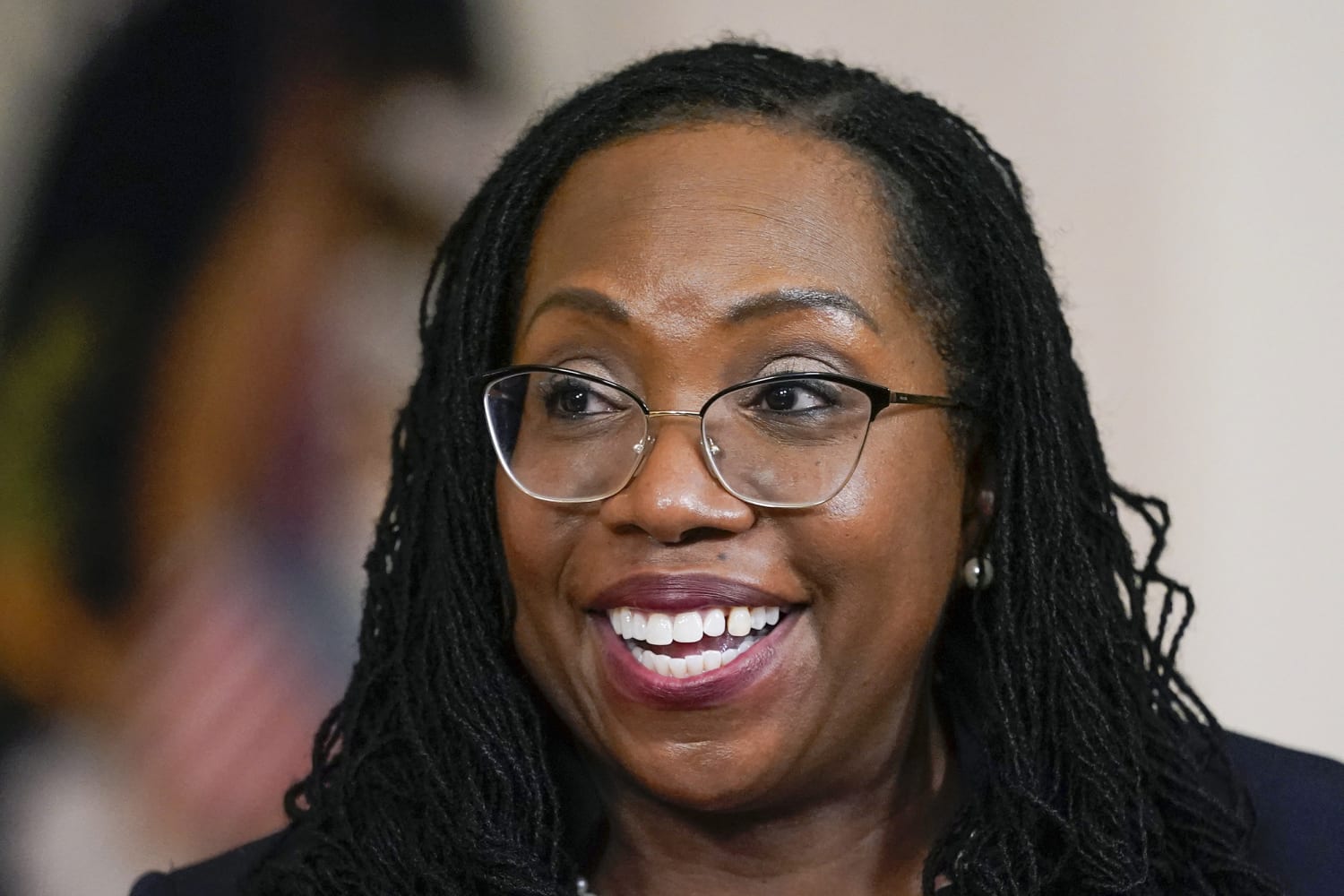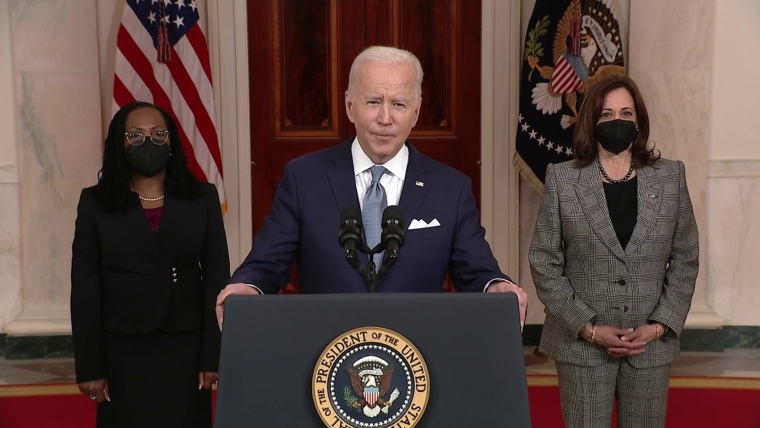When LaTosha Brown, a founder of Black Voters Matter, learned that President Joe Biden had selected Judge Ketanji Brown Jackson as his nominee to the Supreme Court, she had more of an emotional reaction than she thought she would.
If confirmed, Jackson would make history by becoming the first Black woman to serve as a Supreme Court justice.
“It speaks to a new era we’re entering,” Brown said Friday morning shortly after Biden’s announcement. “There’s a woman with locs [dreadlocks] who’s going to be on the Supreme Court.”
If confirmed by the Senate, Jackson would replace Justice Stephen Breyer, the eldest of the court’s members who announced his retirement last month after more than 27 years on the court.
Brown said it was not lost on her that Black women, who have been a central voice of protecting and defending democracy, had “never even been considered in a formal nominee way.”
Brown commended Biden, whose announcement came two years to the day he had pledged on a debate stage in South Carolina before a primary to nominate the first Black woman to the court, for “keeping his word to Black women.” Brown said she was among the activists who had called on Biden to make such a promise.
Jackson, who was born in Washington, D.C., and grew up in Miami, graduated from Harvard University and Harvard Law School.
“One of the things that I really like about the pick: Here’s a woman who graduated from Harvard who was a public defender,” Brown said. “She didn’t have to do that.”
Brown said Jackson is a much more well-rounded pick than the country has seen, particularly from Republican presidents, and should Jackson be confirmed, she would bring a perspective that, quite frankly, has been missing.
“At the end of the day, we’re seeing a court that instead of protecting civil rights, they’ve been stripping civil rights,” Brown said. “We’re looking at a court that has, I think, been increasingly combative against civil rights and voting rights in this nation.”
She added: “We’re in a moment right now where we’re seeing women’s issues attacked. I wish she could be confirmed to be on the court as early as tomorrow.”
Brown said Biden’s selection of Jackson gives her hope that “we’re one step closer to moving toward a representative democratic nation.”
Shevrin Jones, a Florida state senator, was one of many Black people to point out Jackson’s history of bipartisan support in response to Biden’s pick. Biden nominated Jackson to the federal appeals court in Washington, D.C., in the summer.
“Judge Jackson has been confirmed by the Senate on a bipartisan basis three times — most recently last year for her current seat,” he tweeted Friday.
Marc H. Morial, chief executive of the National Urban League, said Jackson was eminently qualified, and it didn’t take her nomination for him to celebrate. He said he took joy in Biden’s commitment two years ago to do so.
Morial said Biden joined a line of presidents who pledged to nominate candidates from particular groups.
“President Reagan committed to put a woman on the court,” Morial said. “President Eisenhower committed to put a Catholic on the court. Presidents in the past committed to put a Jewish justice on the court. President Biden is not the first person to commit to put someone from a particular community on the court. So don’t act like there’s something strange about committing to do this. I think it took a great deal of conviction for him to do it. And I’m glad he did it. He has stuck to his commitment.”
Sherrilyn Ifill, the NAACP Legal Defense and Educational Fund Inc. president and director-counsel, also lauded Biden for keeping his promise.
“We commend President Biden for honoring his pledge to nominate a Black woman as the next Associate Justice to the United States Supreme Court, and we congratulate Judge Ketanji Brown Jackson on her historic nomination — a long-overdue moment for our nation,” Ifill said in a statement. “Diversity on our nation’s highest court sends a powerful message to the country that our justice system is informed by a variety of backgrounds and perspectives, which is critical to ensuring the legitimacy of the Court in a multicultural nation.”
Ifill described Jackson as someone with “stellar credentials” who is serving on “one of the most esteemed appellate circuits in our nation” and who has served as a clerk for Breyer; a public defender in Washington, D.C.; a commissioner on the U.S. Sentencing Commission; and as a judge for the U.S. District Court for the District of Columbia.
The Rev. James “Major” Woodall, former state president of Georgia’s NAACP chapter, said Black people are taught that they have to be twice as good as their white counterparts to get half of what they do.
“And so, we have to go to the Harvards and the Yales just to even be considered not for a Supreme Court appointment, but just to be a lawyer” or “a partner in a major law firm,” Woodall said.
There’s no question, he said, that Black women are, in many ways, the bedrock for American democracy. He noted that Democratic Sens. Jon Ossoff and Raphael Warnock prevailed in Georgia as a result of high Democratic turnout, especially among Black Georgians.
“It was Black women who were leading on the front lines, to mobilize our communities and organize our people, our families to ensure that we had a chance in hell of fighting against such egregious attacks against democracy itself,” he said.
But he said he doesn’t celebrate “historic firsts” anymore.
“Because what essentially that does, it justifies the insult in the injury, that continued exclusion of our people is to be met with celebration, whenever there is finally one that makes it through the door,” he said. “That’s not something we celebrate. It’s the very validation of systemic racism, if anything else.”
Brown, like many others, said she hopes Americans understand the significance of this moment and of the potential Jackson has to inspire a new generation of lawyers just as Thurgood Marshall, the court’s first African American justice, did.
“We have to have a voice of clarity, of reason, of scholarship,” Brown said. “She brings a fullness of perspective that has been intentionally denied. If we ever needed a Ketanji Brown Jackson in the court, it is in this moment right now.”
Source: | This article originally belongs to Nbcnews.com











